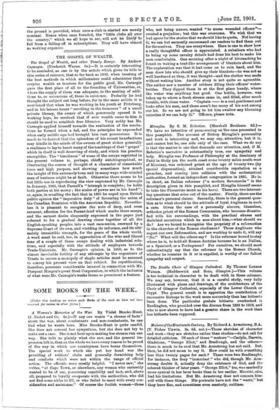SOME BOOKS OF THE WEEK.
[Under ate heading we notice such Books of the week as have not been resorted for review n other forme.]
A Woman's Memories of the War. By Violet Brooke-Hunt. (J. Nisbet and Co. 5s.)—If any one wants "a stream of facts" about the war, about combatants and non-combatants, he can find what he wants here. Miss Brooke-Hunt is quite candid. She does not conceal her sympathies, but she does not try to make out a case. She is not bent upon making her stream run one way. She tells us plainly what she saw, and the general im- pression left is, that on the whole we have every reason to be proud of the way in which our countrymen have borne themselves. The special work to which she put her hand was the providing of soldiers' clubs and generally furnishing help and comforts which were not within the range of official action. The officials were mostly helpful. "I never saw," she writes, "at Cape Town, or elsewhere, any woman who earnestly wanted to be of use, possessing capability and tact, and, above all, prepared to loyally co-operate with the authorities, who did not find some niche to fill, or who failed to meet with every con- sideration and assistance)." Of course the foolish women—those
who, not being nurses, wanted "to nurse wounded officers"— created a prejudice ; but this was overcome. We wish that we had space for the stories that we should like to quote. Not having it, we can but earnestly recommend our readers to find them out for themselves. They are everywhere. Here is one to show how a really thoughtful officer is appreciated. A subaltern who had to bring up some cavalry details had done his best to make his men comfortable. One morning after a night of bivouacking he found on waking a tent-like arrangement of blankets about him. The explanation was that it had come on to rain hard, and the men drew lots who should give up their blankets—he was not as well hardened as they, it was thought—and the shelter was made without waking him. Another story is not quite so agreeable. The author saw a number of soldiers filling their officers' water- bottles. They dipped them in at the first place handy, where the water was anything but good. One bottle, however, was taken up to where a fresh stream came in, and filled, after much trouble, with clean water. "Captain — is a real gentleman and looks after his men, and there aren't too many of his sort among our lot. So we are not going to let him swallow any blooming microbes if we can help it." Officers, please note.










































 Previous page
Previous page